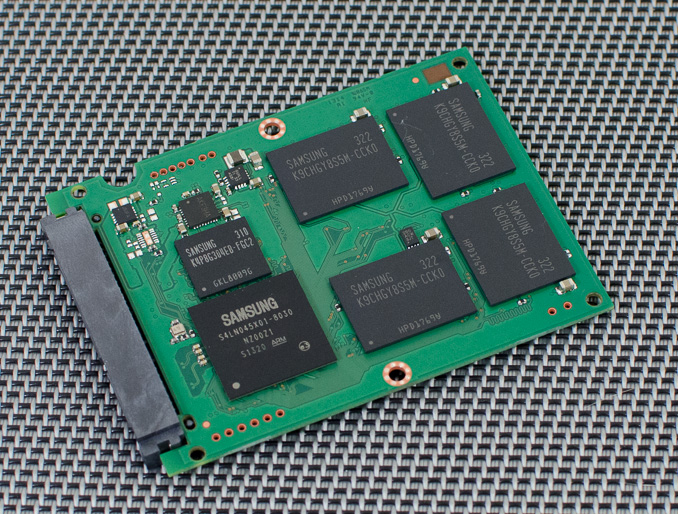Samsung SSD 840 EVO Review: 120GB, 250GB, 500GB, 750GB & 1TB Models Tested
by Anand Lal Shimpi on July 25, 2013 1:53 PM EST- Posted in
- Storage
- SSDs
- Samsung
- TLC
- Samsung SSD 840
Final Words
I was extremely excited about Crucial's M500 because it was the first reasonably priced ~1TB SSD. Even though its performance wasn't class leading, it was honestly good enough to make the recommendation a no-brainer. The inclusion of features like eDrive support were just the icing on the cake. With the EVO, Samsung puts forth a formidable competitor to the M500. It's faster, uses less power at idle and carries lower MSRPs for most of the capacity range. Microsoft's eDrive standard isn't supported at launch, but Samsung expects to change that via a firmware update this September.
Endurance isn't a concern with TLC for client workloads, although I wouldn't recommend deploying the EVO in a write heavy database server or anything like that.
The additional features that Samsung threw in the pot this round really show some innovative thinking. TurboWrite does a good job of blurring the lines between MLC and TLC performance, while Samsung's RAPID DRAM cache offers adventurous users a way of getting a taste of high-end PCIe SSD performance out of an affordable TLC SATA drive.
The 1TB version is exciting because it offers a competitive price with the 960GB M500 but with better performance. It's also good to have an alternative there as the 960GB M500 has been supply constrained at times. At first I didn't believe that Samsung's TLC strategy could hold weight against the Intel/Micron approach of aggressively pursuing smaller process nodes with MLC NAND, but the EVO does a lot to change my opinion. I'd have no issues with one of these drives in my system even as primary storage. The performance story is really good (particularly with the larger capacities), performance consistency out of the box is ok (and gets better if you can leave more free space on the drive) and you've got Samsung's firmware expertise supporting you along the way as well.

To say that I really like the EVO is an understatement. If Samsung can keep quantities of the 840 EVO flowing, and keep prices at or below its MSRP, it'll be a real winner and probably my pick for best mainstream SSD.











137 Comments
View All Comments
Riven98 - Thursday, July 25, 2013 - link
Anand,Thanks for the great article. I had just been thinking that there had been a downturn in the number of articles like these, which are the main reasons I visit on an almost daily basis.
chrnochime - Friday, July 26, 2013 - link
Still recommending a technology that's known to not last as long as the MLC. Yes the *extropolated* result indicates that its lifetime is far longer than advertised, but really, why when even M500 is not that slow in the first place and cost about the same, why risk going with the TLC? Not to mention Samsung's 830 has its fair share of horror stories as well...watersb - Friday, July 26, 2013 - link
Excellent review.How does write amplification scale as the disk fills up? Wouldn't a full disk fail more rapidly than a half-full one?
BobAjob2000 - Tuesday, January 28, 2014 - link
Hopefully wear leveling and TRIM/garbage collection algorithms should take care of your concerns. They should take existing unchanged 'cold' data and move it around to make way for regularly changed 'hot' data. This should reduce the impact of both data longevity and write amplification as it guides new writes to hit the 'freshest' unused or rarely written blocks on the disk and also helps to ensure that data goes not go 'stale' after being untouched for years. Different vendors use different algorithms that have evolved and improved over time. I think Samsung (being a RAM manufacturer) can possibly provide better RAM caches for their disks that may provide advantages for garbage collection and wear leveling algorithms by improving the available 'thinking space' for the caching and sorting/organizing of 'hot' data.Its all to do with managing the 'temperature' of your data somewhat like a data 'weather forecast' which can be very useful in the short term or for simple predictable/settled patterns but less practical for long term or unseasonal data storms.
Would like to see these things tested by 'what if' scenarios though to demonstrate the differences between different vendors algorithms.
xtreme2k - Friday, July 26, 2013 - link
Can anyone tell me why I am paying 90% of the price for 33% of the endurance of a drive?MrSpadge - Saturday, July 27, 2013 - link
Because endurance doesn't matter (very likely also for you), but price does.log - Friday, July 26, 2013 - link
Can you partition this drive and still take advantage of its features? ThnaksTimur Born - Friday, July 26, 2013 - link
I don't quite understand exactly why the Samsung RAPID software cache brings higher performance in *practice* than Windows' own cache? Using two software caches will lead to the same information being stored in RAM twice or even thrice, which is exactly what the Windows cache tries to avoid since XP days.That the usual benchmark programs get fooled is visible, as they think to be working without a software cache. So the higher values there are not surprising. But I am a bit puzzled why the Anand Storage Bench results increase, too?! Why is RAPID software caching better than Windows' own cache in this scenario? Or does the ASB bypass Windows' cache, too (like most benchmarks)?
By the way: ATTO allows the Windows cache to be turned ON for testing. My "old" Crucial M4 256 gets sees very high read results once ATTO makes use of Windows' cache. Only the write rates remain significantly smaller.
Therefor an ATTO test with combinations of either or both software caches (RAPID and Windows) would be interesting.
MrSpadge - Saturday, July 27, 2013 - link
I think it's because Samsung is being much more agressive with caching than Win dares to be, i.e. it holds files far longer before writing them, so they can be combined more efficiently but are longer at risk of being lost.Timur Born - Sunday, July 28, 2013 - link
I am not convinced about that yet, especially since you can turn off drive cache flushing via Device-Manager and thus should get an even more aggressive Windows cache behavior than what RAPID offers (which is reported to adhere to Windows' flush commands).The Windows cache is designed to keep data in RAM for as long as it's not needed for something else. Even more important, data is *directly* executed from inside the Windows cache instead of being copied back and forth between separate memory regions. This keeps duplication to a minimum (implemented since XP as far as I remember). So at least for reads the Windows cache is very useful, especially in combination with Superfetch, which is *not* disabled for SSDs btw (even Prefetch for the boot phase isn't disabled, but in practice it makes not much of a difference whether you boot with or without Prefetch from an SSD).
There is something funky going on with Windows' cache and the drive's onboard cache of my Crucial M4 in combination with ATTO (Windows cache enabled). Different block sizes get very different results, with some *larger* block sizes not benefiting from Windows' cache either at read or write, the latter depending on the block size chosen. Turning the drive's own cache flushing on/off via Device-Manager can have an impact on that, too.
In some cases I get less throughput with Windows cache than without (i.e. 512 kb block size with drive flushing on). This may be an issue of ATTO, though, because I also got some measurements where ATTO claimed a write speed of zero (0)! Turning off either drive cache flushing or the Windows cache or both helps ATTO to get meaningful measurements again.
So the main question remains: How and why would RAPID affect "real-world" performance on top of the Windows cache and does the Anand Storage Bench deliberately circumvent the Windows cache?
The reason I was looking at this review was that I am currently looking for a new SSD to build a desktop PC and the 840 EVO looks like the thing to buy. So once I get my hands on one myself I will just try RAPID myself. ;)